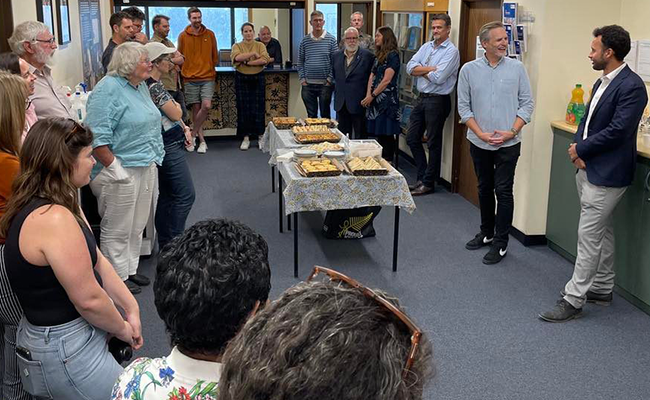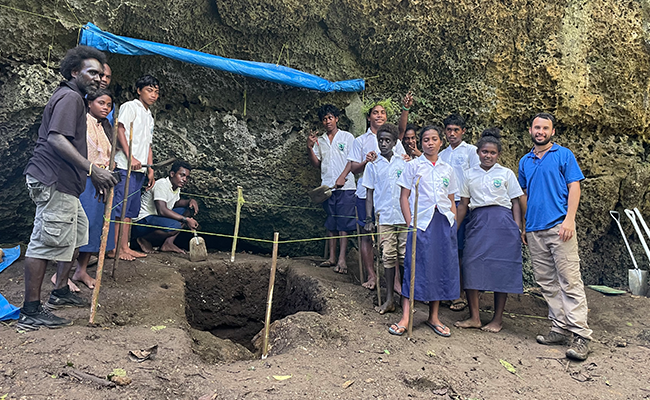
Dr Radclyffe (right) was warmly welcomed by Associate Professor Tim Thomas, the Solomon Islands Dunedin community, the School of Social Sciences and other kaimahi and tauira from Otago.
Dr Charles Radclyffe feels “a huge sense of pride” becoming the first Pacific lecturer in Otago's Mātai Whaipara Takata Archaeology programme.
The Solomon Islands-born kaimahi is of I-Kiribati and British descent, and says he strives to inspire young tauira to consider the various career paths that can be accessed through studying archaeology.
“I want to highlight to our students that archaeology can really enrich our understanding and appreciation of the deep past.
“I hope to incorporate Pacific practices, traditions, peoples, and ways of understanding into my teaching too.”
Dr Radclyffe is a recent graduate of Otago, completing his Bachelor of Arts with First Class Honours in 2015 and his Doctorate in 2020.
He was inspired to pursue a career in academia after presenting at Otago's annual Pacific Voices Symposium following the completion of his Honours year.
The new recruit was appointed alongside Zac McIvor, who is the second Māori lecturer to have ever worked for the programme at Otago.
“Aligning with the University's strategic commitment to empowering Māori and Pacific staff and students, our appointments were an intentional effort by the Archaeology programme to diversify their staff body,” Dr Radclyffe says.
“This represents a milestone in the 105 years of anthropology and archaeology being taught at Otago.”
As well as teaching, Dr Radclyffe is developing a community-based field programme in Solomon Islands that will look for early evidence of human settlement in cave sites.
“Ideally we would like to find earlier evidence of human settlement than what we have so far, because it's likely that it's there, but it just hasn't been found yet.”

Dr Radclyffe (right) hosted tauira from Wagina High School on an excursion to a cave site in Solomon Islands.
The Archaeology lecturer believes that forming meaningful relationships with the communities he is working with and serving is the best approach to all forms of research.
“It's not about just going in, carrying out field research, getting your data and that's it.
“It's a matter of forming those deeper, longer-lasting and reciprocal relationships where the communities themselves contribute to the co-designing and undertaking of the research.”
Like his research, he wants the benefits of learning to be reciprocal with his tauira.
“It's not about saying 'I've got a doctorate, I know far more than you guys, listen to me'. It's more about learning together.”
“And if there is something that sparks a student's interest that's connected to archaeology or anthropology in some way, I want to think about how we can grow that, so that they can gain employment and contribute towards their career-building.
“I want to encourage them to think more boldly about the lives and careers they want. Thinking more about how they can contribute back to their communities in a meaningful way.”
Dr Radclyffe has been taught by nearly all of the current staff in the Archaeology programme, who he says are advocates for nurturing the archaeological interests of tauira.
“I'm a product of that legacy, of them working hard to provide opportunities and to get funding for indigenous postgrad students and those interested in archaeology to come study at Otago. I see it as my duty to carry that on.
“I aim to draw in funding from wherever I can to get more Pacific postgrad students coming through our programme, and then ideally for them to return to their home countries to contribute towards developing regional cultural heritage practices, archaeological research and conservation.”
Dr Radclyffe received a welcome that was well-attended by the Solomon Islands community in Dunedin, as well as Māori and Pacific kaimahi and colleagues from the School of Social Sciences and wider university.
“It's quite surreal. During my programme's welcome for me, I was quite emotional.
“I'm grateful for the sense of family that we have in the programme.”
